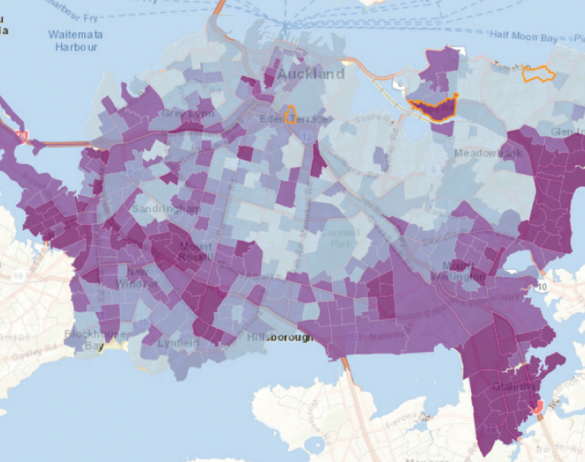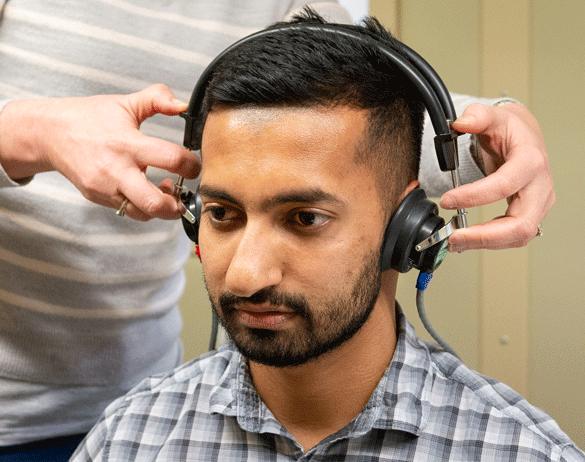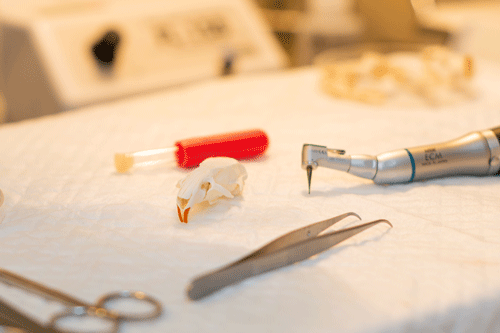
Principal Investigator: A/P Daniel Exeter, University of Auckland
Associate Investigators:National Foundation for the Deaf
This study explores geographic variations in hearing health across New Zealand, using whole-of-population data sets. Using ‘big data’ maintained by Statistics New Zealand, the researchers aim to produce an online atlas to inform clinicians, researchers, planners and the public about the patterns of hearing loss, and other factors associated with poor hearing health in New Zealand.

Responses to communication signals in the avian Medial Suprior Olive (n. laminaris).
Principle Investigator: Dr M Fabiana Kubke
Responses to communication signals in the avain Medial Suprior Olive (n. laminaris).
Principle Investigator: Dr M Fabiana Kubke
Understanding how the auditory system is able to process speech signals is of crucial importance for the amelioration of the effects of hearing disabilities on social interactions. Speech is unique among other sounds in that it plays a significant role in social interactions. Songbirds, and in particular zebra finches, have proved to be an ideal animal model for the processing of human speech sounds as the neural mechanisms and neuronal circuits that underlie song learning show many parallels with the neural circuits that mediate speech learning and production in humans.
This study will examine the activity of neurons in the region of the brain that is important for sound localisation. Zebra finches to not perform well when behaviourally challenged to localise sound and their neurons do not exhibit the same features of activity as other animals that perform well on these tasks. It is hypothesised that the activity of these neurons in zebra finches has evolved to allow processing of vocal features of sound. This will provide important insight to how humans process speech sounds.

Disentangling Bottom-Up and Top-Down Aetiologies of Auditory Processing Disorder
Principle Investigator: Dr. Abin Kuruvilla-Mathew (University of Auckland). Associate Investigators: Prof. Suzanne Purdy (University of Auckland), Prof. Ian Kirk (University of Auckland), Prof. Peter Thorne (University of Auckland), and A/P Wayne Wilson (University of Queensland).
Disentangling Bottom-Up and Top-Down Aetiologies of Auditory Processing Disorder
Principle Investigator: Dr. Abin Kuruvilla-Mathew (University of Auckland). Associate Investigators: Prof. Suzanne Purdy (University of Auckland), Prof. Ian Kirk (University of Auckland), Prof. Peter Thorne (University of Auckland), and A/P Wayne Wilson (University of Queensland).
Auditory Processing Disorder (APD) is a complex disorder that is unlikely to be purely from dysfunction of parts of the brain that process auditory information. Networks in the brain that facilitate attention also appear to be involved.
The overall goal of this study is to identify if there are deficits in attention networks that contribute to listening difficulties in APD. Activity in these networks in the brain in response to challenging auditory discrimination tasks will be monitored electrically and using brain imaging techniques (fMRI). Children and adolescents with typical or impaired auditory processing will be tested and the central hypothesis is that the subjects with APD will show reduced activation and connectivity of attentional networks than age-matched control subjects.
This study will help develop an important clinical paradigm to evaluate the interactive and individual roles of attentional or cognitive processes during challenging auditory discrimination tasks and will provide strong foundations for improved diagnosis and treatment of auditory processing difficulties in high risk groups such as children.

MiRNA cochlear and blood biomarkers of cochlear inflammation
Principle Investigator: Prof. Peter Thorne (University of Auckland). Associate Investigators: A/P Srdjan Vlajkovic, Dr Ravi Telang, Prof. Mike Dragunow (University of Auckland), Dr Phil Bird (University of Otago)
MiRNA cochlear and blood biomarkers of cochlear inflammation
Principle Investigator: Prof. Peter Thorne (University of Auckland). Associate Investigators: A/P Srdjan Vlajkovic, Dr Ravi Telang, Prof. Mike Dragunow (University of Auckland), Dr Phil Bird (University of Otago)
When our hearing organ, the cochlea, is damaged, e.g. from noise exposure, cancer drugs, insertion of cochlear implants, inflammatory processes are initiated that may give rise to further injury of the cochlear tissue and lead to greater hearing loss. However, these processes are poorly understood in humans due to an inability to access the cochlear tissue which is encased in bone.
Advances in treatments would be accelerated if biomarkers for cochlear inflammation could be identified in the blood. MicroRNAs (miRNAs) are small molecules that are receiving considerable interest internationally as they regulate many different processes in the body. miRNAs appear to be elevated in plasma after noise exposure or tinnitus in humans and may provide this biomarker for cochlear injury and inflammation.
This project aims to identify changes in expression of specific inflammatory mediating miRNA in cochlear tissues at different stages of inflammation and see if they correlate with blood miRNA levels.